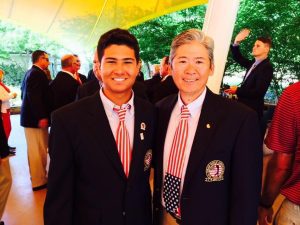A Golfer’s Journey – Gerald Isobe
 The thwack of a crushed drive. The thump of a properly executed bunker shot. The rattling of a ball after it falls into the hole. Gerald Isobe has never heard any of those sounds, yet he’s still enjoyed a golf life richer than most.
The thwack of a crushed drive. The thump of a properly executed bunker shot. The rattling of a ball after it falls into the hole. Gerald Isobe has never heard any of those sounds, yet he’s still enjoyed a golf life richer than most.
Born in Hawaii and deaf since birth, the now 70-year-old was introduced to the game as a teenager when his father took him to watch pros like Lee Trevino in the Hawaiian Open at Waialae Country Club in Honolulu. Isobe had played baseball and basketball, but communication in those sports was proving difficult. “Seeing the pros got me motivated to play golf,” he said. “So I joined a Hawaii Junior Golf program for two years during high school and loved it. I’m so thankful for my father introducing me to the game.”
Isobe got good enough to play in college (earning All-America status at Rochester Institute of Technology in New York) and won the inaugural U.S. Deaf Golf Championship in 1982. “When I got the flyer for that event, my father didn’t think I was good enough,” said Isobe, who has traveled throughout the U.S. and around the world for competitions. “But I wanted to prove him wrong. The competition was tough due to the state and regional deaf champions, and I was an unknown from a small island. But it was a great honor to win. That gave me even more inspiration to spread the game among deaf golfers.”
He’s done that and more. In 2015 he became the first person from Hawaii to be inducted into the U.S. Deaf Golf Association Hall of Fame. He has helped mentor other deaf golfers, including Pono Tokioka, a Kauai High School and UH-Manoa golfer, who won the Far West Deaf Golf Association of the Deaf tournament last week. The duo represented the USA in the 2012 World Deaf Golf Championship played in Japan. He also served as the junior varsity golf coach at the Punahou School in Honolulu for more than a decade.
His journey in golf has not been without obstacles along the way, however. “I once had an instructor who would tell me to just hit it, hit it, hit,” said Isobe, now a 3.5 handicap with seven holes-in-one. “He explained things more in depth to hearing people, but to me he would just say to hit it. I also didn’t get the complete picture of swing theories. There was no interpreter or sign language being used. Now we’ve overcome a lot because of technology.”
Strangers he gets paired with when playing – he’s a big fan of Troon-managed courses including Kapalua, Kā’anapali, the Ocean Course Hokuala, Pearl Country Club, Kapolei, and Princeville Makai – are still surprised by his skills, however. “I would meet people who just assumed I would play from the forward tees, but when they saw me hit from the blue tees, they were surprised,” he said. “I’ve got a smooth swing and can hit it pretty far, so that gets their respect. After seeing me play, more people were asking me to join their group.”
Describing himself as an “average” lip reader, Isobe and his son Brandon developed App MyEar, which converts voice to text in real time using an iPhone, iPad, or Apple Watch. It allows him to read almost every word of what someone says when they speak at normal pace. “The App helps bridge the communication gap, not just with strangers at 19th holes, but even with family and relatives,” he said.
Isobe, who worked as a sign language teacher and accountant, has used golf for networking purposes. “I would introduce co-workers to golf and they in turn would teach me things about the job. It was good for work and for golf. Team sports aren’t quite that way. Golf is good for your entire life.”
He does acknowledge that there’s still plenty of work to be done for deaf golfers. “I know the rules of golf, but there are still situations at tournaments that can be different at each course. It would be nice to have interpreters at events, but that just doesn’t happen. Even if there was basic sign language available, that would be a big help. I’m comfortable being deaf and have gotten used to people’s expressions when they first meet me at the course. Communication is a challenge, but I think accepting and recognizing that is helpful.”
Isobe, who will be making his ninth individual appearance in the 13th bi-annual World Deaf Golf Championships, being played this October at Wailua Municipal Golf Course on Kauai, remains amazed at where the game has taken him. “Golf has made me more independent,” he said. “I have really enjoyed meeting people and seeing different cultures through my travels. Golf provides a great environment for socialization.”
Follow #GolfForEveryone
For more stories on Troon’s DEI initiative and associates
Learn more about Troon’s DEI Initiatives, Associates and Stories.